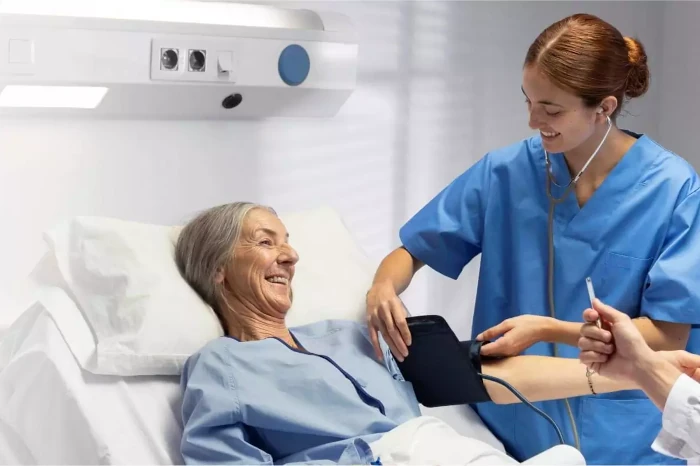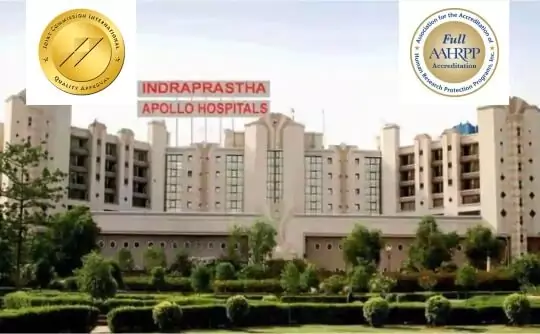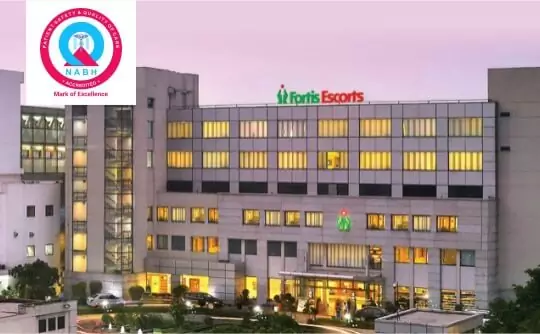

A significant component of a PDA device closure cost in India is the heart surgeon's fees. IndiCure recommends highly experienced, skilled, board-certified heart surgeons who can deliver excellent results. While the charges may vary based on the surgeon's experience, you can be confident that you are in safe and capable hands when opting for affordable heart surgery in India with IndiCure Health Tours.
In the pursuit of enhancing patient care, the medical field continually introduces new techniques and technologies into surgical procedures. These innovative advancements are designed to improve outcomes, reduce recovery times, and increase the overall effectiveness of treatments. While these advancements can significantly benefit patient care, they may also lead to higher cost of PDA device closure in India.
Selecting an accredited medical facility with skilled and qualified medical staff is essential for the success of the PDA device closure procedure in India. Larger cities in India generally provide superior medical facilities and more experienced heart surgeons, leading to higher costs. IndiCure Health Tours recommends surgical facilities in these larger cities to prioritize quality of care and ensure safety of our international patient guests.
The surgery-related expenses include the pre- and post-surgical expenses. The pre-surgical expenses are associated with the age and medical condition of the patient and thus the number and type of investigations required. Post-surgical expenses may include prescription medications and follow-up consultations.
At IndiCure, we consolidate most of the expenses for your PDA Device Closure cost in India to provide you with an inclusive and cost-effective package tailored to your budget and individual requirements. After receiving medical reports, your case manager will provide an estimated cost based on a discussion with the heart surgeon in India.
The final PDA Device Closure cost in India can however be confirmed after your face-to-face consultation with the heart surgeon.

We Help you Choose the Right Treatment, Surgeon & Hospital

We Arrange Video/Telephonic Consultation with the Surgeon

We Assist you with Visa & Accommodation

We Receive you at the Airport and Drop you at Hotel/Hospital

We Assist you the at Hospital & Provide Post Operative Support
IndiCure Health Tours offers exclusive savings on your medical travel to India. We partner with best hospitals in India and negotiate special rates for our overseas guets, ensuring you get the best possible price on your healthcare when you plan your medical travel with us.

Here is a set of questions you should consider asking before commencing your journey for PDA Device Closure procedure in India.
Prepare to answer questions about your:
A PDA is a hole in the aorta that isn't closed.
The fetus's blood does not need to get to the lungs to get oxygenated before birth. The ductus arteriosus is a hole in the heart that allows blood to bypass the circulatory system and go straight to the lungs. However, the blood must get oxygen in the lungs when the infant is born, and this hole is meant to close. If the ductus arteriosus remains open (or patent), blood may bypass this crucial step in the circulation process. The patent ductus arteriosus is the name for the open hole (PDA).
Because the heart and lungs do not have to work as hard when the PDA is tiny, it will not cause symptoms. A specific sort of murmur could be the only abnormal finding (noise heard with a stethoscope).
The infant may breathe faster and harder than usual if the PDA is big. Infants may struggle to eat and grow at a typical pace. Symptoms may not appear for several weeks after the baby is born. Because more blood than usual is pumped into the lungs, high pressure might develop in the blood vessels. The blood arteries in the lungs may be permanently damaged as a result of this over time.
The PDA may usually be closed by introducing catheters (long thin tubes) into the blood vessels in the leg to reach the heart and the PDA and then placing a coil or other device into the PDA like a plug through the catheters.
Any infant, either full-term or preterm, who has a hemodynamically severe PDA that needs to be closed.
The transcatheter PDA closure will take approximately 45 minutes and is done under general anesthesia.
A catheter will be inserted into the femoral vein in the baby's groin by the cardiologist. They'll use X-ray imaging to route the catheter to the heart and find the PDA. They'll next put an occlusion device into the baby's PDA through the catheter.
This device will block the vessel and prevent blood from going into the lungs after it is in place. Finally, doctors will remove the catheter with care and cover the groin access point with a small bandage.
Most patients with a modest unrepaired PDA or a treated PDA don't need to take any additional precautions and can go about their daily lives without risk. Even if you don't have pulmonary hypertension, your cardiologist may advise you to limit your physical activity for a short time after surgery or catheter closure.
The long-term outlook is excellent, and usually, no medicines and no additional surgery or catheterization are needed.

New Delhi
Indraprastha Apollo Hospitals, New Delhi is a state of the art multi speciality tertiary-care hospital situated in the most posh area of South Delhi. Considered to be the flagship hospital of Apollo group, Indraprastha Apollo Hospital is one of the important landmarks not only in Delhi, but in the world map because of its popularity among the medical tourists. The hospital has been one of the most sought after medical institutions for patients from Asia Pacific and beyond.

New Delhi
Fortis Escorts Heart Institute and Research Centre is one of the most revered medical institutions not only in India, but the entire world. The institute has set benchmarks in cardiac care with path-breaking work over the last 25 plus years. The hospital has the most advanced technology and has seen the best outcomes even in the most complex cardiac cases; be it cardiac surgery, Interventional Cardiology, Pediatric Cardiology, Pediatric Cardiac Surgery or Non-invasive Cardiology
The ductus arteriosus, a vital blood vessel in a fetus, normally closes within two to three days after birth as part of the body's natural transition to postnatal circulation. Before birth, the ductus arteriosus allows blood to bypass the lungs, which are not yet in use. After birth, as the newborn begins to breathe on their own, this vessel becomes unnecessary and typically seals off. However, in premature infants, this closure can take longer, often due to underdeveloped lungs or low oxygen levels. If it remains open, it is termed a patent ductus arteriosus (PDA) and may require monitoring or treatment.
In many cases, a small PDA may close on its own without intervention, especially in newborns and infants. However, larger or symptomatic PDAs often require treatment. Pediatric cardiologists monitor the condition over time through regular checkups, checking for signs of spontaneous closure. If the PDA does not close naturally and causes symptoms such as breathing issues, fatigue, or growth delays, medications like indomethacin or ibuprofen might be administered to help facilitate closure. If these approaches fail, surgical or catheter-based closure may be necessary to prevent lung damage, heart strain, or complications like pulmonary hypertension. Timely treatment helps ensure healthy development and reduces the risk of long-term issues.
A PDA's size plays a crucial role in determining how much blood flows incorrectly between the aorta and pulmonary artery, impacting the heart and lungs. The size of the PDA is categorized as follows:
Transcatheter PDA closure is now a preferred method due to its minimally invasive nature and high success rates. It involves inserting a catheter through a blood vessel, typically in the groin, and guiding it to the heart to deliver a closure device that seals the PDA. The procedure is considered safe with minimal complications. However, like any medical procedure, there are some risks to consider, including:
In most cases, these complications are rare and manageable. The recovery period is generally quick, and children can often resume normal activities within a few days after the procedure.
The symptoms of PDA vary depending on its size and the extent of blood flow between the aorta and pulmonary artery. Common signs and symptoms include:
If left untreated, a large PDA can lead to complications such as heart failure or pulmonary hypertension, underscoring the importance of early detection and management.
PDA is one of the most frequently occurring congenital heart defects. Each year, approximately 3,000 newborns in the United States are diagnosed with PDA. It is particularly prevalent among premature infants, whose heart and circulatory systems may not be fully developed at birth.
In fact, the earlier a baby is born, the higher the chance of PDA. Studies show that PDA is about twice as common in females as it is in males, though the reason for this gender difference is not fully understood. Early diagnosis and appropriate monitoring are essential to ensure affected infants receive timely treatment, promoting healthy growth and development.
In addition to the cost of PDA Device Closure procedure in India, there are several other expenses you should plan for when organizing your medical trip to India. These include:
By budgeting for these additional expenses along with the cost of PDA Device Closure in India, you can create a comprehensive budget to ensure a smooth, comfortable and hassle free recovery experience.
Enhance your medical journey to India by availing these extra services.
Traveling abroad for medical reasons may be challenging. With our experience of over a decade and working with the best surgeons and top hospitals in India, we help make your medical tour easier and safer for you. We will guide you at every step of the way and make end-to-end arrangements for your surgery, travel, and stay.
Ramandeep Dhaliwal
I had great experience having rhinoplasty through Indicure. Dr. Ruchika from Indicure has helped me in finding best plastic surgeon, answering all my questions...
Read More
Joshua Archer
My name is Joshua Archer I'm from New Zealand, bay of plenty, kawerau I opted for the bypass surgery in January 2023 but planned it in advance for 28 September found IndiCure...
Read More
Kera Ren
Absolutely loved my experience with IndiCure - from first inquiring to meeting the surgeon pre op to my follow up post op. The surgeon was extremely approachable...
Read More
Andreana Paul
Had a wonderful experience. Visited India for my plastic surgery. From sending mails, airport pickup, comfortable accommodation and, to smooth hospital appointment booking...
Read More
Brandi Luce
I had the privilege of using Indicure's services for a cosmetic procedure that I had wanted for a long time but had always been apprehensive about. Ruchika helped me...
Read More
Jade M
Indicure Health Tours went above and beyond my expectations. They helped me with every aspect of my journey and were professional, kind and caring. I was...
Read More
The content on the website (www.indicure.com) is intended to be general information and is provided only as a service. All photographs on our website of before and after results are examples only, and do not constitute an implied or any other kind of certainty for the result of surgery.
Learn about IndiCure Health Tours' comprehensive editorial policy that strives to deliver trustworthy, helpful, relevant, accurate and people-first content on medical tourism in India.
It is not medical advice and should not be taken as medical advice. It should not be used to diagnose or treat a health condition and is in no way meant to be a substitute for professional medical care. You are advised to see a surgeon in person to assess what surgery may or may not accomplish for you.
It is also important to keep your expectations realistic and to understand that all surgical procedures carry risks and should never be taken lightly.